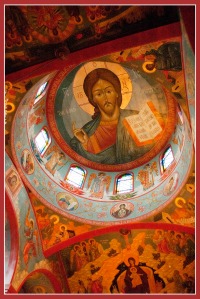 We’d like to describe what we feel are the main objections to the two defining claims of two contrary theistic worldviews we’ve introduced, “classical” theism’s defining and non-negotiable claim that God is actus purus (a God in whom there is no unfulfilled potential) and Process theism’s belief in a God who is, if we may coin the phrase, processu operis, a “work in process” (whose existence and perfections are constituted in and as the ever changing process of God’s ongoing relationship with the universe).
We’d like to describe what we feel are the main objections to the two defining claims of two contrary theistic worldviews we’ve introduced, “classical” theism’s defining and non-negotiable claim that God is actus purus (a God in whom there is no unfulfilled potential) and Process theism’s belief in a God who is, if we may coin the phrase, processu operis, a “work in process” (whose existence and perfections are constituted in and as the ever changing process of God’s ongoing relationship with the universe).
Before we jump into the objections of these two understandings of God, I want first to clarify our earlier question about whether the Orthodox affirm actus purus. It is after all a well-known axiom of scholastic (Western) theology embodied in Aquinas, and the Orthodox are on record as criticizing scholasticism in general and the failure of the West to make a key Orthodox distinction between God’s essence and his energies. Fr Aidan also earlier registered some reservation about our suggestion that the Orthodox believe in actus purus. So before we describe the objections to both ‘classical’ and ‘process’ views, we’d like to offer a clarification.
All we mean by actus purus is what we understand Orthodox theologian David Hart to refer to as the denial of all potentiality in God. If that’s not an Orthodox belief, that would be great news to us. Besides Hart, I also remember discussing this over lunch with Paul Gavrilyuk a couple of years ago. He had mentioned what a promising work he thought Richard Creel’s Divine Impassibility (1986) was. “But Creel is an open theist,” I thought to myself. So when I asked Paul about open theism and what the main Orthodox objection(s) to it would be, he slightly shook his head and said that it goes too far by placing God “in time,” and that this wasn’t compatible with Orthodoxy. I get this sort of reminder that the Orthodox do share the fundamental tenet of actus purus (viz., that there is no potentiality in God) even though they don’t use the phrase and can criticize what the West does with it. But we’re open to the Orthodox clarifying this for us.
Tom, you will remember Hopko’s implementation of Pope Benedict saying “saying and unsaying to a positive effect, and was part of the introduction in Hopko’s festschrift in honor of Kallistos Ware. The part I’m thinking of was where Hopko offered that it was in love that God did not limit his creating only to those who would love him back. (Can you find it in any of my quotings on the other site?) I just want to say that I don’t think God’s love requires an open view. Nor the Trinity an aesthetic view.)
BEAUTIFUL BLOG!!!
What do you think?
LikeLike
Hi Bruce. I haven’t been to the “other site” in a very long time. I don’t think it sees traffic anymore. And the search engine there doesn’t work, so there’d be no way to track down something like that.
So Bruce, do you believe with the Orthodox that there is no potentiality in God?
LikeLike
I don’t see where we need it.
The follow is not EO. but is evangelical at Oxford U. I like how it expresses things like our tendency to express about God in ways appropriate to us but not God. (listen around minutes 11 or 13)
http://sptc.htb.org.uk/godpod-71
LikeLike
Why can’t there be potentiality in God?
LikeLike
Well, potentiality “with respect to ___” isn’t problematic I don’t think. It depends on what the potentiality is. I can’t think of some unfulfilled potential which in God’s case would be problematic. I can think of others that don’t present any obvious problems.
LikeLike
Yeah 🙂 To me there seems to be a lot of potentiality… For example God being able to stop hating (Psalm 5:5) when we flee from His wrath (Romans 5:8) etc. (If I got it right)
LikeLike
Do you think God goes from ‘hating’ people to ‘loving’ them?
LikeLike
No but his hate for them and their sins can disappear.
LikeLike
St. Maximus in his Four Hundred Chapters teach us that God is beyond actuality and potentiality, that no actuality or potentiality can be found in Him
Actuality = actualized potentiality, and potentiality = yet to be actualized actuality. These are creaturely conditions not applicable to God
But we speak of God as Manifest in His Energies and Unmanifest in His Essence. The one isn’t a fulfillment and the other isn’t potentiality, but Immanence of the Transcendent God and Transcendence of the Immanent God
So Aquinas is teaching conflation, not Simplicity. Simplicity simply means unpartitioned, or without parts. The Three Hypostases are not parts nor the Energies many parts making up one whole God, but Each Hypostasis and each Energy is wholly and entirely God
LikeLike